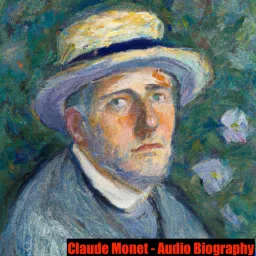Claude Monet - Audio Biography

Claude Monet: A Life Embraced by Light and Color Early Life and Artistic Awakening: Born in Paris in 1840, Claude Monet wasn't destined for artistic life. His family envisioned a career in commerce, but young Monet harbored a different dream: to paint. Drawing caricatures as a teenager, his talent flourished under the tutelage of Eugène Boudin, who introduced him to plein air painting, capturing nature's essence directly outdoors. This pivotal moment shaped Monet's artistic compass, leading him away from the confines of traditional studios and towards the vibrant symphony of light and color in the open air. From Rebel to Revolutionary: In 1860, Monet enrolled at the Académie Suisse, rejecting the rigid art school dogma. He befriended Pierre-Auguste Renoir and Camille Pissarro, like-minded artists who shared his fascination with natural light and fleeting impressions. They defied the conventions of the Salon, the official art establishment, favoring spontaneous brushstrokes and capturing momentary effects over idealized forms. This artistic rebellion culminated in the infamous 1874 Salon des Refusés, where Monet's "Impression, Sunrise" sparked the term "Impressionism." His depiction of a hazy harbor bathed in soft morning light, seemingly unfinished yet pulsating with life, challenged the polished landscapes of the era. A Life in Pursuit of Light: Monet's life became a relentless pursuit of light's ever-changing moods. He moved to Argenteuil, immersing himself in the scenery of the Seine, and later built his beloved Giverny, where his iconic water lily series blossomed. He embarked on painting pilgrimages, capturing the vibrant coastal scenes of Normandy and the sun-drenched Italian landscapes. His obsession with light culminated in his monumental Haystacks series, where the same subject, bathed in different seasons and times of day, became a symphony of color and shadow. Beyond Impressionism: Monet's artistic journey wasn't confined by the label "Impressionist." He experimented with serial painting, capturing the same scenes at various times to express light's transient nature. He embraced the burgeoning Art Nouveau movement, creating the ethereal Water Lilies murals for the Orangerie in Paris. Even in his later years, his vision remained sharp, his late Rouen Cathedral series showcasing a bolder, more abstract approach to capturing light and form. Legacy and Influence: Claude Monet died in 1926, leaving behind a legacy that transformed the art world. His Impressionist revolution liberated artists to explore light, color, and fleeting moments. His innovative techniques and dedication to en plein air painting inspired generations of artists, from Van Gogh and Cézanne to modern Impressionists. Today, his works continue to captivate audiences, his vibrant canvases embodying the fleeting beauty of the world around us. Thanks for listening to Quiet Please. Remember to like and share wherever you get your podcasts.































